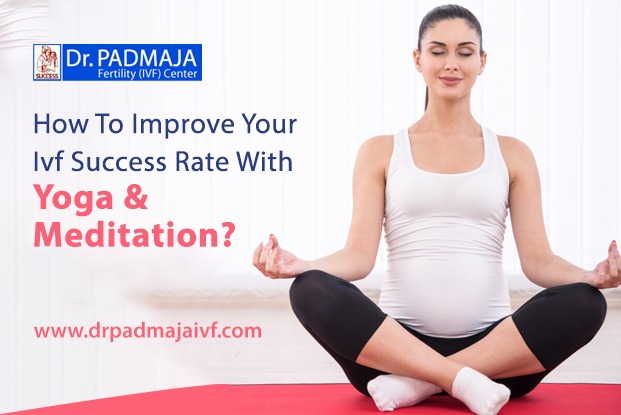In vitro fertilization (IVF) is a popular and highly effective treatment for couples struggling with infertility. However, the IVF process can be emotionally and physically taxing, often leading to stress, anxiety, and a sense of overwhelm. While medical advancements have significantly increased the success rates of IVF, incorporating alternative practices like yoga and meditation into your routine can have a profound impact on improving your chances of success.
If you’re considering IVF treatment and want to increase your likelihood of a positive outcome, practices such as yoga and meditation can complement medical procedures, offering both physical and emotional benefits. Here’s how yoga and meditation can help improve your IVF success rate and enhance your fertility journey, with tips from some of the best IVF centers in Hyderabad, including Dr. Padmaja IVF Center and Drpadmaja Fertility Center.
1. Reducing Stress and Anxiety
One of the most significant challenges that many women face during IVF treatment is the emotional toll it takes. The stress of injections, hormonal treatments, and the uncertainty of the outcome can lead to anxiety and feelings of helplessness. Research has shown that high levels of stress can negatively affect fertility by interfering with hormone levels and reproductive health.
Yoga and meditation are highly effective in reducing stress and calming the mind. Deep breathing exercises, coupled with mindfulness techniques, help lower cortisol levels, the hormone associated with stress. This not only improves overall well-being but also creates a more balanced hormonal environment, which can enhance your chances of IVF success.
2. Improving Blood Flow to Reproductive Organs
Yoga is known to improve circulation and promote better blood flow throughout the body. Certain yoga poses, such as the “supta baddha konasana” (reclining bound angle pose), “viparita karani” (legs-up-the-wall pose), and “paschimottanasana” (seated forward bend), are particularly beneficial for improving blood flow to the pelvic area and reproductive organs.
Good circulation ensures that the reproductive organs receive the oxygen and nutrients needed for optimal functioning. This increased blood flow can promote better egg quality, improved endometrial lining, and more efficient implantation of the embryo during IVF. Practicing yoga regularly can prepare your body for the physical demands of IVF while enhancing your fertility.
3. Balancing Hormones
Hormonal balance is crucial for both natural conception and IVF success. Imbalances in hormones like estrogen, progesterone, and thyroid hormones can impede the IVF process. Yoga and meditation help regulate the endocrine system, balancing the release of essential hormones.
Practices such as pranayama (breathing exercises) and restorative poses activate the parasympathetic nervous system, which aids in hormone regulation. By reducing stress and boosting relaxation, yoga and meditation can help your body respond better to the IVF medications, improving the chances of a successful embryo transfer and implantation.
4. Boosting Mental and Emotional Resilience
IVF treatment can be emotionally exhausting. It’s not uncommon for women to experience feelings of frustration, sadness, or hopelessness throughout the process. Yoga and meditation help cultivate emotional resilience by teaching mindfulness, acceptance, and emotional release.
The practice of meditation allows individuals to focus on the present moment, reducing negative thought patterns that can arise due to stress or worry. By developing emotional strength and a more balanced mindset, you are more likely to approach your IVF journey with a sense of calm and optimism, which can play a significant role in improving your success rate.
5. Supporting Overall Health and Wellness
Maintaining general health and wellness is essential when undergoing IVF treatment. Yoga not only strengthens and tones the body but also supports flexibility and mental clarity. By keeping your body in optimal condition, you’ll be better equipped to handle the physical demands of IVF procedures.
Additionally, regular yoga practice can improve sleep quality, boost your immune system, and maintain healthy body weight—all of which are crucial for a successful IVF outcome. Ensuring that you are physically and mentally prepared for IVF can significantly impact your chances of success.
6. Finding the Right Support at a Trusted IVF Center
While yoga and meditation can provide invaluable benefits for IVF patients, it is equally important to choose a reputable fertility clinic that can guide you through the process with care and expertise. One of Hyderabad’s top IVF clinics is Dr. Padmaja IVF Center, which offers state-of-the-art facilities and personalized fertility treatments to help couples achieve their dream of parenthood.
Dr. Padmaja’s team of fertility experts understands the importance of holistic care. They often recommend complementary therapies like yoga and meditation to improve overall outcomes. Whether you’re starting IVF or seeking assistance with other fertility challenges, the supportive environment at Drpadmaja Fertility Center ensures that you are cared for every step of the way.
Conclusion
Integrating yoga and meditation into your IVF journey can help you reduce stress, improve hormonal balance, and increase your chances of success. These practices provide both physical and emotional benefits that align perfectly with the goals of IVF treatment. However, it’s crucial to work with a trusted fertility specialist, like the team at Dr. Padmaja IVF Center in Hyderabad, to ensure that your fertility needs are met with the utmost care and professionalism. By combining the benefits of yoga and meditation with the advanced medical expertise of fertility specialists, you’re setting yourself up for the best possible chance of IVF success.
About The Author :

If Dr. Padmaja Divakar is a public figure or a professional in a specific field, I recommend checking her official website, professional profiles, or reliable online sources for the most up-to-date and accurate information about her background, qualifications, and achievements.
Frequently Asked Questions (faqs)
1.Can yoga and meditation directly improve IVF outcomes?
While yoga and meditation cannot guarantee IVF success, they significantly reduce stress and improve overall health, which indirectly supports the IVF process.
2.When should I start yoga and meditation during IVF?
Start as early as possible, ideally before beginning the IVF cycle, to prepare your body and mind. Continue throughout the treatment.
3.Are there any yoga poses to avoid during IVF?
Yes, avoid poses that involve deep twists, intense backbends, or heavy abdominal pressure. Always consult with a fertility-focused yoga instructor.
4.How often should I practice yoga and meditation?
Aim for 3–5 yoga sessions per week and daily meditation. Even 10–15 minutes of mindfulness can make a difference.
5.Can I practice yoga during embryo transfer or implantation?
During this period, focus on gentle, restorative poses and deep relaxation to avoid strain.
6.Are there any risks associated with yoga during IVF?
Practicing incorrect poses or overexerting yourself could potentially harm your progress. Work with a certified yoga therapist familiar with IVF protocols.

